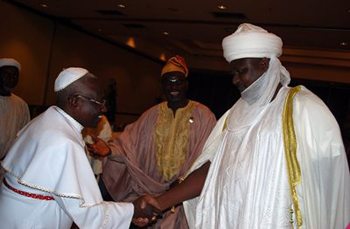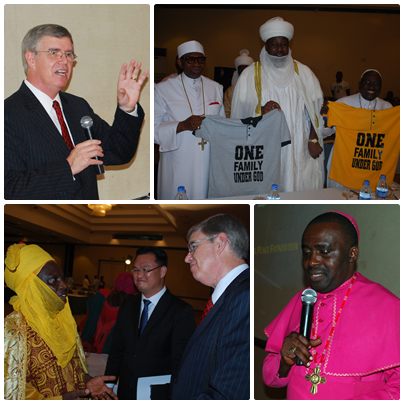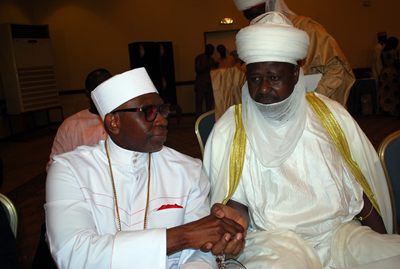The following report appeared on globalpeace.org.
Nigeria’s Religious Leaders and Traditional Rulers Unite for Peace
24-May-2013 |

The Prelate of the Methodist Church Nigeria (left) meets with the Andoma of Doma at the Consultative meeting organized by the Global Peace Foundation in Abuja.
Just days after Nigeria’s President Goodluck Jonathan declared a state of emergency in three states in northern Nigeria, more than 180 eminent Muslim, Christian and traditional tribal leaders from across the country gathered for a consultative meeting to address the rising sectarian violence and social disorder in the West African nation of 170 million.
The meeting was organized by the Global Peace Foundation (GPF) on the theme “The Role of Religious Leaders and Traditional Rulers in Building a Culture of Peace, National Unity and Integration,” and took place on May 16, 2013 in the capital, Abuja of Nigeria.
One hundred years after the amalgamation of the Northern and Southern protectorates to form present-day Nigeria, the country remains divided along the lines of religion, tribe and ethnicity. It is widely recognized even by government that religious and traditional rulers play important roles in building social cohesion in Nigeria. Yet, bringing these leaders together on a neutral platform to speak in one voice has proven difficult.

Left top: GPF President James Flynn stresses the importance of shared values in building social cohesion at the Consultative meeting; right top: Christian and Muslim leaders call for Nigerians to unite as One family under God. Below left: H.E. the Emir of Abuja meets with GPF Africa regional representative Insu Choi and GPF President James Flynn. below right: Bishop Sunday Onuoha, President of Nigeria Interfaith Action Association, facilitated the meeting.
Militants from the extreme Islamist insurgent group, Boko Haram, have been blamed for most of the violence, which has left some 2,000 people dead since 2010. Nigeria’s security forces have also been strongly criticized by human rights groups for extra-judicial killings and attacks against civilians.
Bishop Sunday Onuoha, President of Nigeria Interfaith Action Association (NIFAA) who facilitated the meeting thanked the Global Peace Foundation for bringing together religious leaders and traditional rulers, who are the core custodians of values and beliefs, to explore collaborative approaches to peace in a time of crisis.
The meeting was co-moderated by Rev. John Joseph Hayab and Sheik Halliru Maraya, both Special Advisers to the Kaduna State Governor on Religious issues. Rev. Hayab informed representatives that GPF’s forthcoming Global Peace Leadership Conference and Festival are scheduled to be held in Nigeria in November, while Sheik Halliru Maraya explained how GPF’s vision of ‘One Family under God’ is a truth grounded in the Quran and needs to be promoted throughout Nigeria.
Addressing the meeting, GPF International President James Flynn thanked participants for pursuing a path of peace for all Nigerians and emphasized the importance of faith in the life of the nation. “Studies have actually identified Nigeria as the most religious nation in the world,” Mr. Flynn said. “That is a very significant and rich resource, in fact the most important resource from my point of view.”
Mr. Flynn presented an overview of GPF’s work to advance sustainable peace in fifteen nations and said the challenge is to utilize the devout faith of diverse traditions for the good of all and to uplift the values of compassion, forgiveness and good will that are shared among all religious traditions.
“Based on a common commitment to shared values and their own moral authority, religious leaders and traditional rulers can serve as the conscience of the nation, working together to uplift and build consensus around those shared values,” Mr. Flynn said. He further emphasized that the building blocks of peace begin within each individual, so bringing peace with our own lives can extend to our families and communities.
Two key leaders of the Muslim and Christian communities in Nigeria responsed to Mr. Flynn. Representing the Sultan of Sokoto, the Andoma of Doma—himself a notable traditional ruler—said that the Sultan fully identifies with the Global Peace Foundation’s initiatives. His Eminence added that everybody should return to the basics, stressing our human equality regardless of color, tribe and race.
“What makes the difference before God, what endears you to God and what makes you acceptable to God, is the degree of your goodness that has benefited mankind.”
—the Andoma of Doma, spokesman for the Sultan of Sukoto

Pastor Ayo Oritsejafor, the President of the Christian
Association of Nigeria (left), greets the Andoma of Doma.
Pastor Ayo Oritsejafor, the President of the Christian Association of Nigeria (left),greets the Andoma of Doma.“What makes the difference before God, what endears you to God and what makes you acceptable to God, is the degree of your goodness that has benefitted mankind,” he said. He then charged faith leaders and their followers to apply the teachings of the Holy Books to the benefit of mankind in the cause of lasting peace.
Pastor Ayo Oritsejafor, the President of the Christian Association of Nigeria, told the assembly that any group which desires peace is doing the right thing. “If we must build a new Nigeria, if we must build a great Nigeria, then all of us together must do everything it takes to build peace. Peace is necessary, peace is possible. But as we build peace we must remember these five key things: love, integrity, equity, truth and justice. They are very simple things we all know, but these are the things we must consciously do every day.”
—Reported by GPF Nigeria
